HVAC Companies Sidmouth
Find the best Heating and Cooling Services in Sidmouth
Receive multiple HVAC Contractor quotes for your project today! Compare profiles, reviews, accreditations, portfolio, etc... and choose the best offer.

M T S Heating - New & Replacement Boilers Exeter & East Devon
56 reviews29 Tristan Close, Beacon Heath, Exeter, EX4 9BT, GBMTS Heating Services offer a full suite of services covering every aspect of hot water and heating solutions. Whether you have a broken boiler, loss of hot water or require a full central heating system, all work is carried out to the highest standards of quality and safety. We are Gas and Heating Engineers who specialize in the installation, service and repair of Boilers, Central Heating Systems and Hot and Cold Water Systems. Our mission is to guide, educate and help customers obtain cost effective energy efficient products.
- Services
- Why Us?
- Accreditations
- Our Team
- Testimonials
- Gallery
Get Quote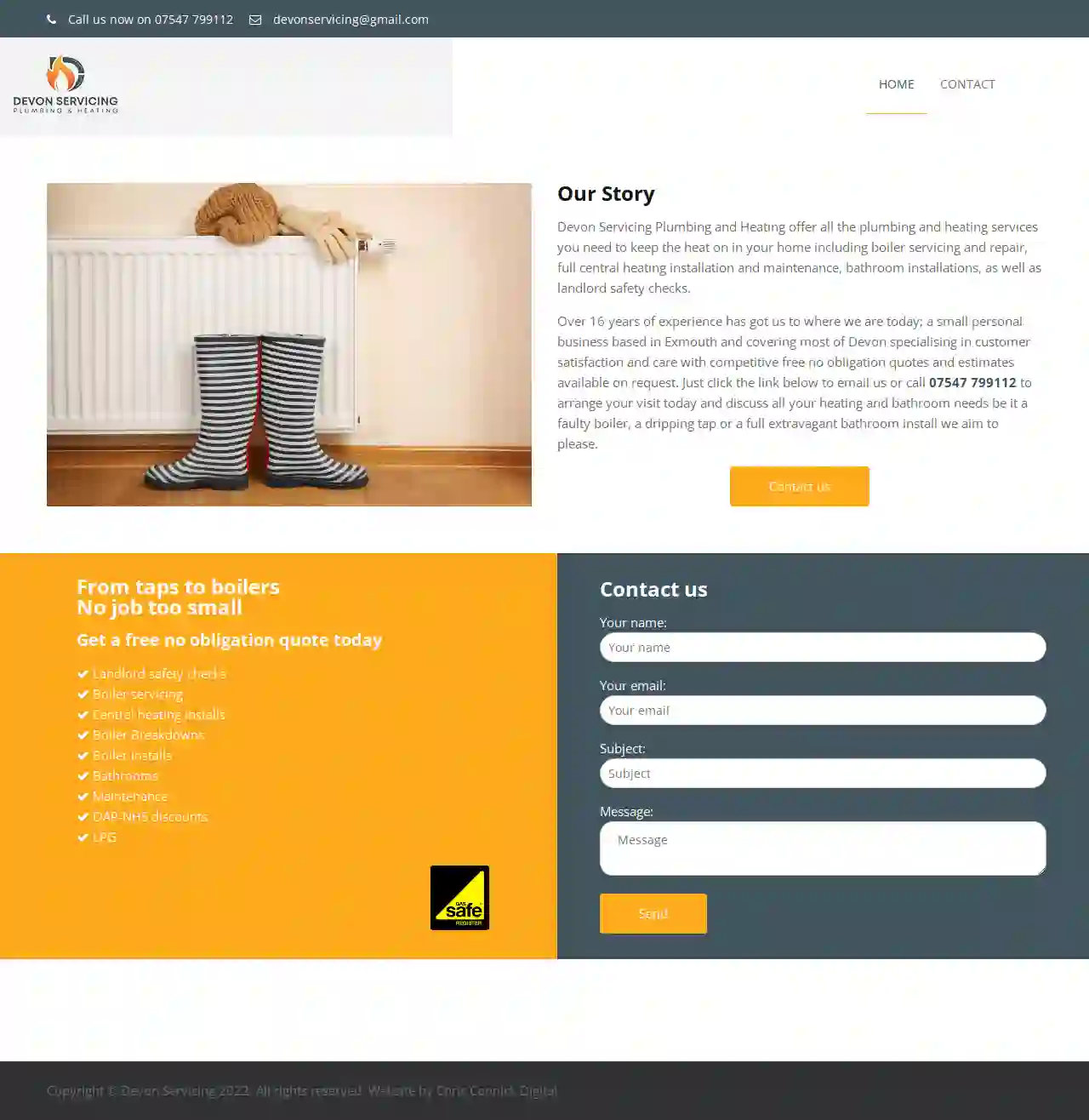
Devon Servicing Plumbing & Heating
Exeter, GBDevon Servicing Plumbing and Heating offer all the plumbing and heating services you need to keep the heat on in your home including boiler servicing and repair, full central heating installation and maintenance, bathroom installations, as well as landlord safety checks. Over 16 years of experience has got us to where we are today; a small personal business based in Exmouth and covering most of Devon specialising in customer satisfaction and care with competitive free no obligation quotes and estimates available on request. Just click the link below to email us or call 07547 799112 to arrange your visit today and discuss all your heating and bathroom needs be it a faulty boiler, a dripping tap or a full extravagant bathroom install we aim to please.
- Services
- Why Us?
- Gallery
Get Quote
F-Tec Property Maintenance Services - Plumbing, Electrical, Mechanical & LED Lighting
4.54 reviewsUnit 1 6 Marsh Green Road North Marsh Barton Exeter, Exeter, EX2 8NY, GBFifields Property Services (Ftec) was established in 2014 and is part of the Fifields Group. With extensive experience in construction and maintenance services, Ftec delivers customized building solutions. These solutions range from internal and external repairs to bespoke proactive maintenance programs, urgent reactive maintenance, and one-off mechanical & electrical installation projects. Ftec has a team of experienced engineers and dedicated support staff who work with clients across various sectors, including education, commercial, industrial, retail and leisure, banking facilities, healthcare, and local authorities. Located near Exeter, Ftec's head office provides convenient access to major routes across the South West, enabling them to deliver fast and efficient service to Plymouth, Truro, Taunton, and Weymouth within a 2-hour radius.
- Services
- Why Us?
- Accreditations
- Gallery
Get Quote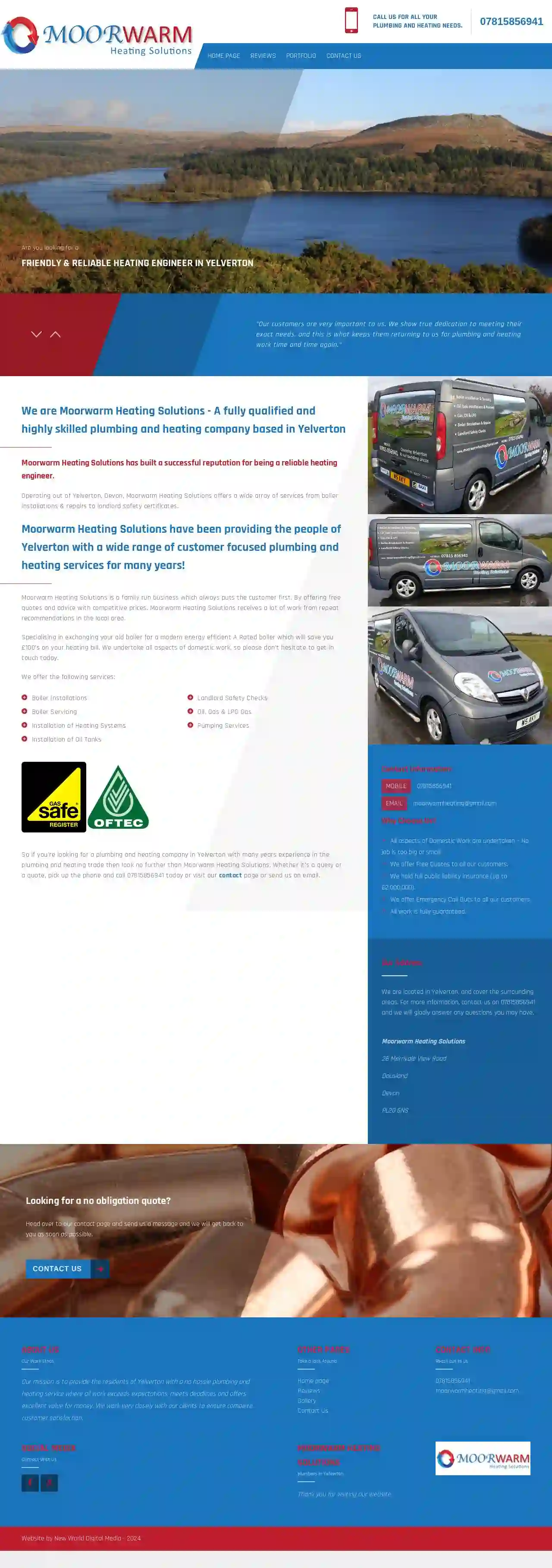
Moorwarm Heating Solutions
593 reviews26 Merrivale View Road, Yelverton, PL20 6NS, GBMoorwarm Heating Solutions is a fully qualified and highly skilled plumbing and heating company based in Yelverton. We have built a successful reputation for being a reliable heating engineer. Operating out of Yelverton, Devon, Moorwarm Heating Solutions offers a wide array of services from boiler installations & repairs to landlord safety certificates. We have been providing the people of Yelverton with a wide range of customer-focused plumbing and heating services for many years! Moorwarm Heating Solutions is a family-run business that always puts the customer first. By offering free quotes and advice with competitive prices, we receive a lot of work from repeat recommendations in the local area. Specialising in exchanging your old boiler for a modern energy-efficient A-Rated boiler, which will save you £100's on your heating bill. We undertake all aspects of domestic work, so please don't hesitate to get in touch today.
- Services
- Why Us?
- Our Team
- Testimonials
- Gallery
Get Quote
A B Engineering Oil Heating & Cooking
512 reviewsLauderdale House, Lauderdale Drive, Barnstaple, EX32 8LF, GBAB Engineering SW Ltd is a family-run business based in Barnstaple, Devon, providing a comprehensive range of heating and plumbing services. With over 20 years of experience, they are experts in oil boilers, gas boilers, AGA & Rayburn appliances, oil tank installation and servicing, power flushing, and solar thermal water heating. They pride themselves on offering a reliable, efficient, and friendly service to both domestic and commercial customers. Their team of qualified engineers is committed to providing expert advice and solutions tailored to each customer's individual needs.
- Services
- Why Us?
- Gallery
Get Quote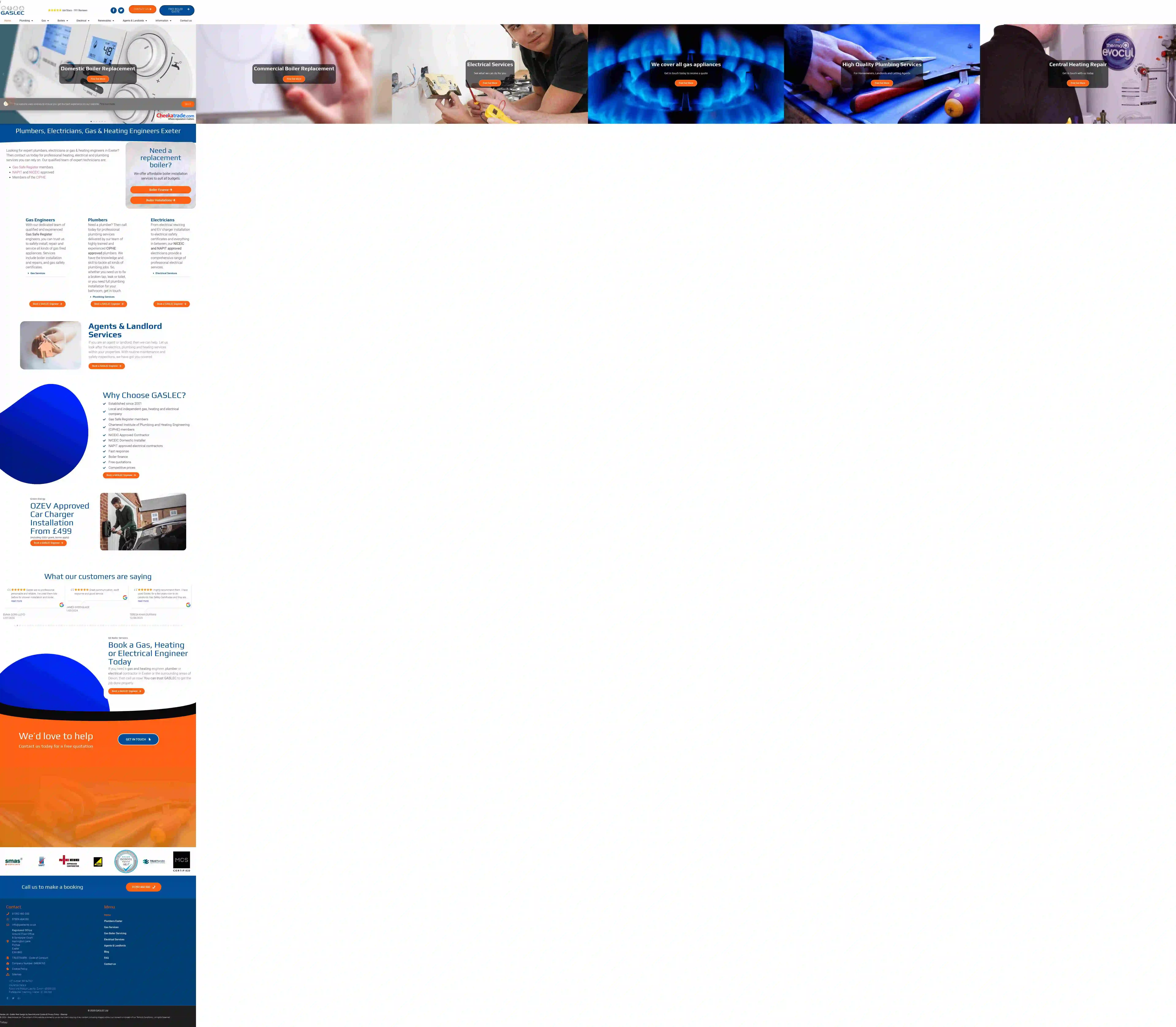
GASLEC Ltd
4.7159 reviewsExeter, GBEstablished since 2001, GASLEC is a local and independent gas, heating and electrical company. Our team of expert technicians are Gas Safe Register members, NAPIT and NICEIC approved, and members of the Chartered Institute of Plumbing and Heating Engineering (CIPHE). We offer a range of services including boiler installation, repairs, and servicing, as well as electrical services such as rewiring, domestic electrical repairs, and electrical testing. We also provide plumbing services, including radiator installation, thermostat and controller installation, and underfloor heating installation. Our team is dedicated to providing fast, reliable, and professional services to our customers.
- Services
- Why Us?
- Accreditations
- Our Team
- Testimonials
- Gallery
Get Quote
Kensa Contracting
Mount Wellington, Chacewater, Truro, TR4 8RJ, GBKensa Contracting delivers pioneering and high-quality MCS accredited ground source heat pump projects at scale. With unrivalled experience and expertise, and a UK-wide network of expert consultants and contractors, Kensa Contracting offers a complete turnkey delivery service. The company provides access to grants, subsidies, and funding for ground source heat pumps and Shared Ground Loop Arrays, including zero-cost infrastructure. Kensa Contracting is an expert in grants & subsidies and funding for ground source heat pumps and Shared Ground Loop Arrays, including zero-cost infrastructure.
- Services
- Why Us?
- Accreditations
- Our Team
- Testimonials
- Gallery
Get Quote
Earth Inspired Limited
54 reviewsUnit 9, Coxleigh Barton, Shirwell, EX31 4JL, GBEarth Inspired is a plumbing and heating company based in North Devon, providing domestic and commercial services. With over three decades of industry experience, our team of highly qualified plumbers, gas and oil engineers offer a comprehensive range of services including boiler repair, servicing, replacement, new installations, heat pumps, underfloor heating, and MVHR. We are Gas Safe Register, OFTEC, and MCS certified, ensuring our work meets the latest safety legislation. Our team is dedicated to providing reliable, professional, and efficient services, with a focus on customer satisfaction and building long-term relationships.
- Services
- Why Us?
- Accreditations
- Our Team
- Testimonials
- Gallery
Get Quote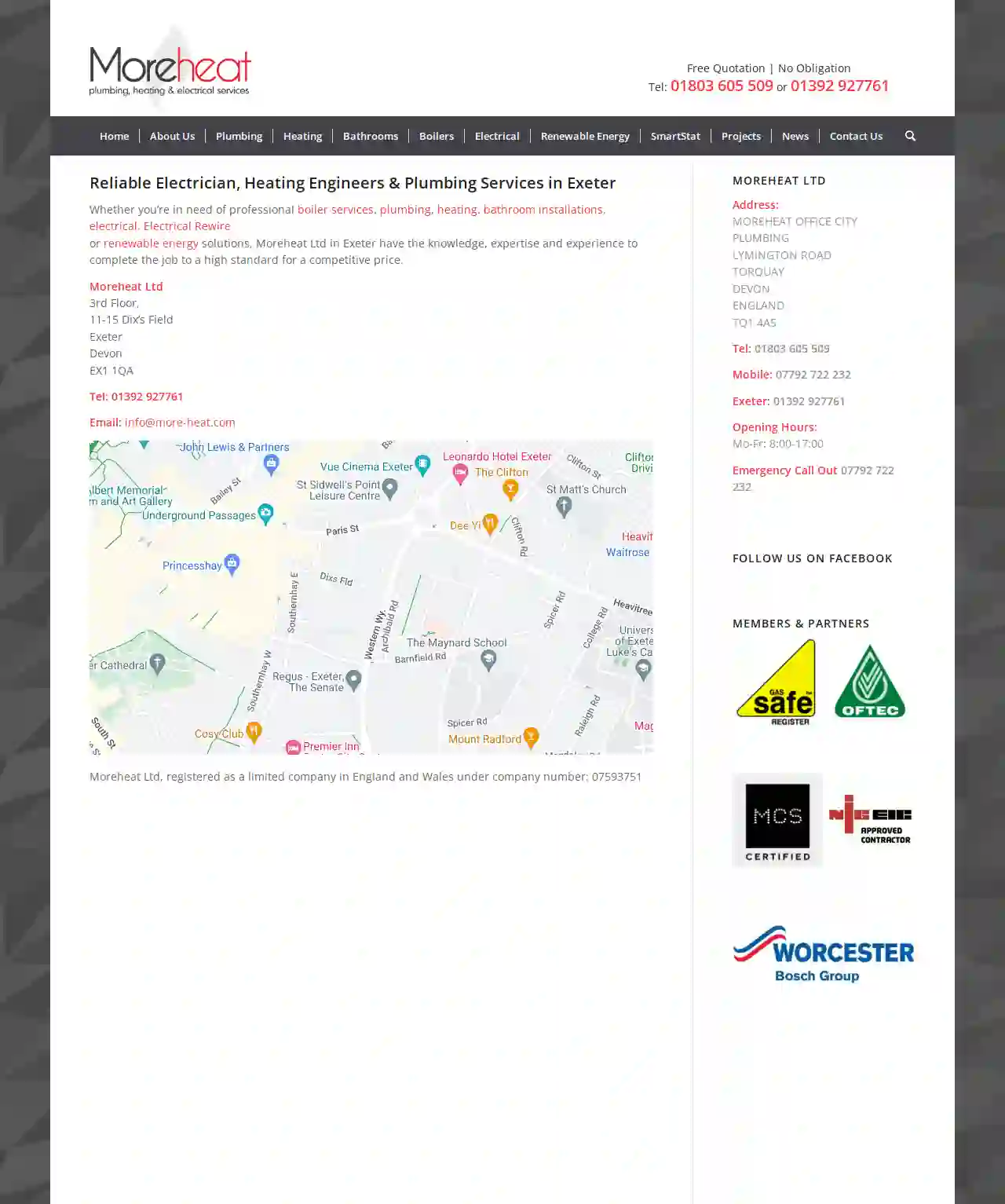
Moreheat Ltd
Exeter Devon, 3rd Floor, 11-15 Dix’s Field, Exeter, EX1 1QA, GBMoreheat Ltd is a reliable and trusted plumbing, heating, and electrical services provider serving Torquay, Torbay, and South Devon since 1998. Founded by Scott Rylance and John Cooper, who have over 30 years of combined experience in the industry, Moreheat has built a reputation for delivering high-quality workmanship and exceptional customer service. The company offers a wide range of services, including gas boiler installations, repairs, and upgrades, as well as plumbing, bathroom refurbishments, kitchen refurbishments, renewable energy solutions, and commercial heating boiler installations. Moreheat is committed to providing competitive pricing, a 10-year guarantee on new boiler installations, and a punctual and reliable workforce. They are Gas Safe registered, SafeContractor approved, and accredited by the Microgeneration Certification Scheme, ensuring customers receive safe and reliable service. In 2022, Moreheat expanded its services to include electrical work through Moreheat Electrical, led by long-standing subcontractor James Pointing. This new arm offers a comprehensive range of electrical services, including full rewires, electrical testing, Quantum heating installations, fault finding, and fuse board/consumer unit replacements. Whether you need routine boiler maintenance, emergency plumbing, or a complete bathroom renovation, Moreheat Ltd is your one-stop shop for all your plumbing, heating, and electrical needs.
- Services
- Why Us?
- Accreditations
- Our Team
- Gallery
Get Quote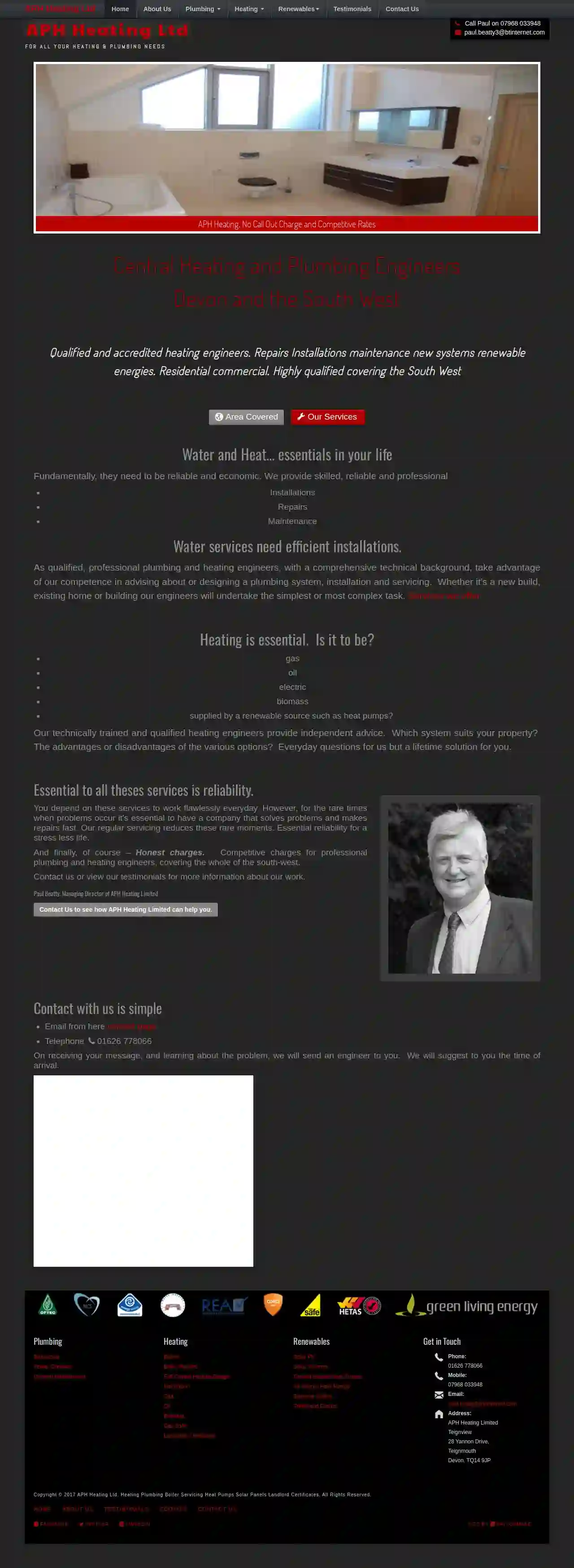
APH HEATING
3.911 reviewsTeignview, 28 Yannon Drive, Teignmouth, TQ14 9JP, GBAPH Heating Ltd is a team of qualified and accredited heating engineers serving Devon and the South West. We provide a comprehensive range of services, including installations, repairs, and maintenance for all types of heating and plumbing systems. Our expertise covers gas, oil, electric, and biomass boilers, as well as renewable energy solutions such as heat pumps. We pride ourselves on our reliability, professionalism, and competitive pricing. At APH Heating, we understand that your heating and water systems are essential to your daily life. That's why we strive to provide efficient, reliable, and cost-effective solutions tailored to your individual needs. Whether you're looking for a new boiler installation, repairs to your existing system, or regular maintenance to keep things running smoothly, our team of experienced engineers is here to help. We are committed to providing honest and transparent pricing, and we will always discuss the options available to you in detail before commencing any work. Contact us today to learn more about how APH Heating can help you with all your heating and plumbing requirements. Paul Beatty, Managing Director of APH Heating Limited
- Services
- Why Us?
- Accreditations
- Our Team
- Testimonials
- Gallery
Get Quote
Over 12,692+ HVAC Companies on our platform
Our HVAC contractors operate in Sidmouth and beyond!
HVACCompaniesHub has curated and vetted the Best HVAC Businesses arround Sidmouth. Find the most trustworthy pro today.
Frequently Asked Questions About HVAC Companies
- Check Online Reviews: Look for HVAC companies with positive reviews and high ratings on platforms like Google, Yelp, and others.
- Ask for Referrals: Reach out to friends, family, neighbors, or colleagues for recommendations.
- Verify Licensing and Insurance: Ensure the company is properly licensed and insured to operate in your area.
- Look for Certifications: Check for certifications from reputable organizations like NATE (North American Technician Excellence).
- Compare Quotes: Get quotes from multiple HVAC companies to compare pricing and services.
- Use a Directory like HVACCompaniesHub: Simplify your search by using our directory of pre-screened and qualified HVAC professionals.
- What is the source of the problem? Get a clear explanation of the issue and what caused it.
- What are my repair options? Discuss different repair solutions, if applicable, and their associated costs.
- Are there any preventative measures I can take? Find out if there are steps you can take to prevent future problems.
- Do you recommend a repair or replacement? If repairs are extensive or the system is old, consider replacement.
- What are the warranties on parts and labor? Understand the warranties before agreeing to any repairs.
- Do you have any customer reviews or testimonials I can check? Reputable HVAC technicians are often happy to provide references or direct you to customer reviews.
- Climate: Heat pumps are generally more efficient in moderate climates, while furnaces are better for colder regions.
- Budget: The upfront cost of different systems can vary significantly.
- Energy Efficiency Goals: Higher-efficiency systems are usually more expensive upfront but result in lower energy bills over time.
- Home Size and Layout: The square footage and layout of your home affect the system's capacity and ductwork requirements.
- Existing Ductwork: If you have existing ductwork, you'll need a system compatible with it.
How do I find a good HVAC company near me?
Finding a reputable HVAC company requires research. Consider these tips:
What should I ask an HVAC technician during a service call?
How often should I have my HVAC system serviced?
What type of HVAC system is best for my home?
How do I find a good HVAC company near me?
Finding a reputable HVAC company requires research. Consider these tips:
- Check Online Reviews: Look for HVAC companies with positive reviews and high ratings on platforms like Google, Yelp, and others.
- Ask for Referrals: Reach out to friends, family, neighbors, or colleagues for recommendations.
- Verify Licensing and Insurance: Ensure the company is properly licensed and insured to operate in your area.
- Look for Certifications: Check for certifications from reputable organizations like NATE (North American Technician Excellence).
- Compare Quotes: Get quotes from multiple HVAC companies to compare pricing and services.
- Use a Directory like HVACCompaniesHub: Simplify your search by using our directory of pre-screened and qualified HVAC professionals.
What should I ask an HVAC technician during a service call?
- What is the source of the problem? Get a clear explanation of the issue and what caused it.
- What are my repair options? Discuss different repair solutions, if applicable, and their associated costs.
- Are there any preventative measures I can take? Find out if there are steps you can take to prevent future problems.
- Do you recommend a repair or replacement? If repairs are extensive or the system is old, consider replacement.
- What are the warranties on parts and labor? Understand the warranties before agreeing to any repairs.
- Do you have any customer reviews or testimonials I can check? Reputable HVAC technicians are often happy to provide references or direct you to customer reviews.
How often should I have my HVAC system serviced?
What type of HVAC system is best for my home?
- Climate: Heat pumps are generally more efficient in moderate climates, while furnaces are better for colder regions.
- Budget: The upfront cost of different systems can vary significantly.
- Energy Efficiency Goals: Higher-efficiency systems are usually more expensive upfront but result in lower energy bills over time.
- Home Size and Layout: The square footage and layout of your home affect the system's capacity and ductwork requirements.
- Existing Ductwork: If you have existing ductwork, you'll need a system compatible with it.